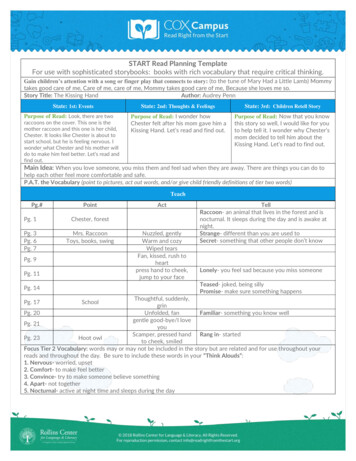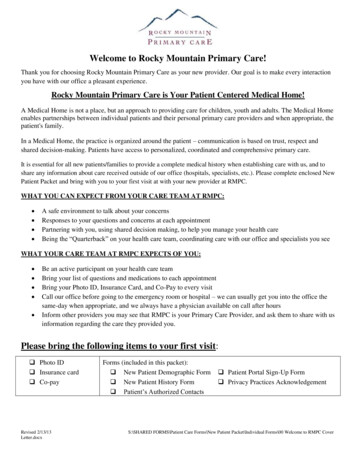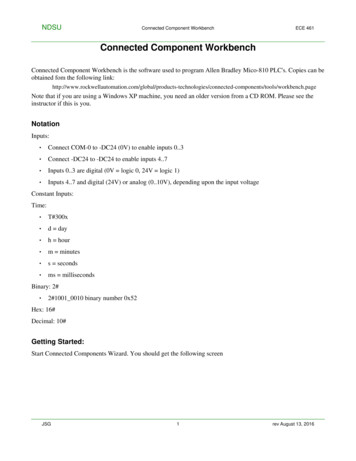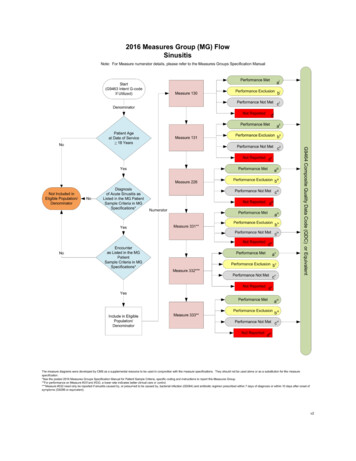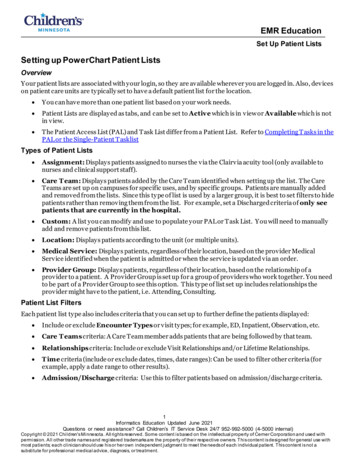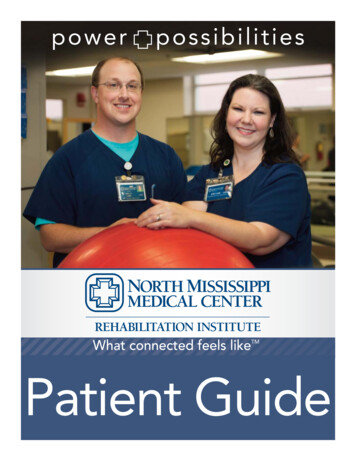
Transcription
powerpossibilitiesWhat connected feels likeTMPatient Guide
WelcomeYou most likely did not expect life to take you down this road. Chances are your illness or injury was unexpectedand now you are uncertain about what the future holds. We are honored that you have entrusted us with your care.We are committed to helping you regain your highest level of independence on your road to recovery.Rehabilitation InstituteOur Mission: To provide a holistic and integrated program of medical, physical, psychosocial and vocationalinterventions that empower the physically challenged person to achieve a fulfilling, socially meaningful andfunctionally effective transition to the person’s community of choice.Our Vision: To be a nationally recognized center of excellence in rehabilitation and recovery of individuals whohave experienced surgical or medical complications throughout life.Our History: Since the NMMC Rehabilitation Institute opened in 1988, our staff has been providing patientcentered rehabilitative care to individuals who have suffered catastrophic injury or illness.Our Values: Collaboration Commitment Compassion Continual education CommunityWho Benefits from Inpatient RehabilitationThroughout recovery, our goal is to help patients maximize their functional independence, find emotional strengthand successfully transition back to the community. Patients are evaluated along functional rather than disease specific guidelines. Functional problems may include: impaired mobility, communications skills, safety in performingactivities, and perceptual and cognitive skills.Who could benefit from the Rehabilitation Institute? Someone who Has experienced a significant loss of basic skills and requires an intensive team approach in the deliveryof care Requires daily supervision and medical management from our medical team, which will oversee thefunctional plan of care Requires 24-hour rehabilitation nursing care Is able to tolerate at least three hours of therapy daily, five to seven days per week Has the ability to achieve his or her rehabilitation goals in a reasonable period of timeTeam EffortRehabilitation is based upon the team approach. Our interdisciplinary team of professionals works with patientsand their families to design a rehabilitation plan to satisfy each individual’s specific needs and personal goals.When a patient is admitted to the Rehabilitation Institute, the patient care team conducts a comprehensiveassessment to identify potential needs and degree of functional disability. The team will then establish a plan ofcare and work hand in hand with patients and families to achieve the highest level of functioning possible. Teammembers work intensively with the patient each day and meet together weekly to review each patient’s progress.
Professionals on the Rehabilitation Team: Physical Medicine and Rehabilitation Doctor Nurse Practitioner Rehabilitation Nurse Physical Therapist Occupational Therapist Speech Pathologist Social Worker Rehabilitation Case ManagerThe rehabilitation team also relies upon other professionalsto provide support services as needed. These professionalsinclude: Dietitian Chaplains Orthotist Prosthetist Pharmacists Respiratory TherapistsYour Rehabilitation TeamPhysical Medicine and Rehabilitation Doctor: The team leader, responsible for coordinating your overalltreatment with other team members, focuses on restoring function to people with disabilities.Nurse Practitioner: Assists the physician in managing the care of the patient in a team approach; facilitatescommunication between disciplines; develops diagnoses; plans, implements and manages medical care.Rehabilitation Nurse: A nurse who specializes in rehabilitative care and assists the patient with achievingmaximum independence, prevention of complications, and patient and family education.Physical Therapists: Primarily address functional activities such as bed mobility, transfers, ambulation (usingassociated adaptive equipment such as walkers, braces and wheelchairs), patient/family education and wound careas needed.Speech-Language Pathologists: Assess and treat deficits with communication and cognition, including problemsolving, reasoning and memory. Speech therapists also evaluate and address problems with swallowing.Occupational Therapists: Address upper extremity coordination and strengthening activities of daily living(ADLs) such as dressing yourself properly and safely, hygiene and feeding yourself. In addition to techniques,occupational therapists can address cognitive issues and offer adaptive equipment to assist in performing tasks.Social Worker/Case Manager: A liaison for the patient, family and rehabilitation team. Social workers providesupport, coordinate the team care plans, manage the discharge plan with referrals and coordinate care withinsurance companies. Your social worker will help guide your care from your initial assessment through theday of discharge.
NMMC Patient PortalNMMC offers every patient access to a personal Patient Portal, an online health management tool designed tohelp you take control of your health. Patient Portals allow patients to interact and communicate with their healthcare providers. This secure site lets you access portions of your personal medical record, find important healthinformation and even send a secure message to your clinic.To access the Patient Portal and register, visit www.nmhs.net/portals.phpAccreditation & Licensure CARF International (inpatient adult rehabilitation and stroke)Gold Seal of Approval from The Joint Commission for Primary Stroke CentersComprehensive Integrated Inpatient Rehabilitation Program (adult)Mississippi State Department of HealthMedical StaffAurora Wong, M.D.: Serves as medical director of North Mississippi Medical Center’s RehabilitationInstitute. Dr. Wong received her bachelor’s degree in biology and neuroscience from the University ofToronto in Canada. She completed her medical degree at St. George’s University School of Medicinein Grenada, West Indies. She trained in general surgery at St. Francis Medical Center and St. JosephMedical Center in New Jersey before completing her physical medicine and rehabilitation residencyat Tufts Medical Center in Boston, Mass., where she served as chief resident. She previously served asmedical director of the Acute Inpatient Rehabilitation Unit and director of Physical Medicine and Rehabilitation atAppalachian Regional Medical Center in Hazard, Ky.David Richmond, M.D.: Earned a bachelor’s degree in psychology in 1992 from MarshallUniversity in Huntington, W.V. He continued his education at Mountain State University in Beckley,W.V., becoming a physician assistant in 1998. He worked as a physician assistant for several yearsbefore going to medical school. Dr. Richmond earned his medical degree in 2006 from St. GeorgesUniversity in Grenada, West Indies. He completed an internship in 2007 at Long Island CollegeHospital in Brooklyn, N.Y., and a residency in physical medicine and rehabilitation in 2010 fromTufts Medical Center in Boston, Mass. He is board certified in physical medicine and rehabilitation.Dr. Richmond previously served as assistant clinical professor at Tufts University School of Medicine and practicedphysical medicine and rehabilitation at Baystate Medical Center in Springfield, MA.Collette Dixon, FNP-C: Received bachelor’s and master’s degrees in nursing from MississippiUniversity for Women. She also holds a master’s degree in business administration from LaSalleUniversity. She has worked with acute rehabilitation patients for many years.Tina Shelton, FNP-C: Earned an associate’s degree in nursing from Northeast MississippiCommunity College and her bachelor’s degree in nursing from Mississippi University for Women.She completed her master’s degree in nursing and family nurse practitioner training at the Universityof Southern Mississippi.
Important Phone NumbersYour Room Phone .(662) 377-8 room number1 West Nurses Station .(662) 377-4060North Mississippi Medical Center .(662)377-3000830 S. Gloster St., Tupelo, MS 38801Careline (concerns and/or compliments) .(662) 377-2273Hospital Security .(662) 377-3064Rehab Social Work .(662) 377-4034(662) 377-4057Chaplain Services .(662) 377-3439NMMC Physical Medicine and Rehabilitation ClinicLongtown Medical Park, 4381 Eason Blvd., Suite 301, Tupelo, MS 33801Clinic Phone Number .(662) 377-6610Clinic Fax .(662) 377-6614What to BringDuring your stay in the Rehabilitation Institute, having some of your personal items from home can make you feelmore comfortable. This could mean bringing your books and photographs or a favorite T-shirt and sweater. Thechecklist below will help you pack for your stay.Items to consider bringing: Toothbrush Shaving supplies Makeup Comb or brush Deodorant Shampoo and other hair care productsRehabilitation Institute can provide some personal care items if needed.For Rehabilitation Program PatientsRehabilitation patients will get up and dressed every day for therapy. You need an assortment of comfortable, loosefitting clothes. For all clothes, be sure to label them with your name in permanent marker.Clothing Suggestions Pajamas Pants with an elastic waistband, such as cotton or nylon sweatpants Comfortable shirts Lightweight jacket/sweater Socks (athletic style) Underwear Athletic shoes, at least one size larger than usual (one pair) Outdoor wear during the colder months, including warm jacket, heavy sweater and hatWhat Not to Bring Valuable jewelry, expensive electronic items or large amounts of cash. We recommend that no more than 10 be kept in your room at any time. Rehabilitation Institute cannot accept responsibility for lost items. Heaters, heating pads or equipment for food preparation and storage Firearms or other weapons
Cameras and Recording DevicesThe use of cell phone cameras, cameras and video recorders are prohibited if it violates another patient’s privacy.Please limit pictures in patient areas, and no NMHS medical staff or employees may be included in any photos orvideos while providing care.SafetyYour safety is our primary goal. Upon arrival, we will begin educating you and your family regarding your safetywhile in your room, the rehab gym and the dining room. Please remember to call for assistance from a staff memberwhen trying to get out of bed. Please do not hesitate to ask for assistance at any time. As you progress in therapyand your ability to care for yourself improves, the therapy staff may release you to move more independentlyaround in your room. Until you have been cleared by staff, please use your call light for help prior to getting outof bed.A Typical DayPatients in the Rehabilitation Institute will spend a minimumof three hours in therapy each day, at least five days per week.Therapy is also provided on Saturday and Sunday whenneeded. Your therapist can provide a daily therapy scheduleeach morning.Monday-Friday:7-8 a.m.Nursing and/or Occupational Therapywill assist you with dressing.Breakfast will be served in your room.8 a.m.-noonMorning therapyNoon-1 p.m.Lunch and short rest period beforeafternoon therapy1-3 p.m.Afternoon therapy4:30-5:30 p.m.DinnerSaturday & Sunday: Therapy is provided if needed.Family and friends are encouraged to visit.A chapel service is held in theRehab Dining Room on Sundays.Visiting HoursMonday-FridaySaturday-Sunday3-8 p.m.8 a.m.-8 p.m.Our rehabilitation unit is dedicated to providing safe, effective rehabilitation care in a family-friendly manner. Weappreciate the importance of family as a support system and as caregivers after the patient leaves the hospital.The Rehabilitation Institute suggests these visiting hours to optimize recovery. We encourage family and friends tovisit during non-therapy hours to allow the patient to focus on therapy. However, we understand that exceptionsmay arise. Please contact the case manager to develop a visitation plan.For newly admitted patients, we encourage one family member (18 years of age and older) to stay overnight thefirst night to help the patient settle in comfortably. If needed, caregivers will be asked to stay with a patient
continuously to assist with care and supervision. All overnight guests must be cleared by nursing staff and befree of a cold, fever, cough or any illness. Your protection and safety is our first priority.Children may visit if they are free from infectious diseases. This includes runny nose, cough or fever.Do not bring food unless it has been cleared by a nurse. Many patients are on special diets for health reasons orbecause of swallowing restrictions.Please wash or sanitize your hands when entering and leaving a patient room.Your RoleWe will need your complete attention and best efforts during all activities. A positive attitude is absolutely necessaryto the success of your rehabilitation. You may be asked to perform a task in a new way or participate in therapeuticactivities where you might not understand the benefit. We ask that you keep an open mind and be willing to learnnew tools as you move toward independence. Please feel free to ask questions and discuss your feelings.Discharge PlanningDischarge planning begins when you are admitted into the Rehabilitation Institute. We will make every effort tohelp you feel prepared for your transition home or to your next level of care. A rehabilitation team conference willbe held each week during your rehabilitation stay. Your team will discuss your length of stay, progress, dischargeplanning and follow-up services. This plan of care will be discussed with you and your family to ensure everyoneis in agreement moving forward.Our primary goal is to help you regain as much independence as possible and return to your previous livingenvironment. Unfortunately, that is not always possible and alternative plans must be made with the help of yoursocial worker. Your medical team will work to identify issues that will require family/caregiver education as wellas medication education. Your therapy staff can provide family/caregiver education and teaching as often asneeded to ensure your transition home is successful. Your rehabilitation team will schedule follow-up providerappointments as well as order any medical equipment you might need at discharge.Family InvolvementWe encourage family members to be involved in your treatment by providing moral support and participating inyour recovery. Family members and/or caregivers can participate by scheduling therapy observation, participatingin family conferences when needed, participating in family teaching sessions prior to discharge, participating in anevaluation of your home environment with therapy, and/or transfer car training. Family involvement activities willbe arranged by your rehab social worker.Driving Assessment and TrainingThe Driving Assessment and Training program is physician referred and monitored by an occupational therapist.Prior to driving, a patient must be screened to measure visual perception, reaction time, muscle strength andcognitive abilities. A minimum one-hour drive is modified to meet individual patient needs, usually followingfamiliar paths, in the “rehab car” equipped with adaptive equipment. The therapist makes a recommendationof readiness to physicians and helps patients contact appropriate companies for installing adaptive equipmentin their own vehicles.
Therapeutic Leave ProgramThe Therapeutic Leave Program allows patients who are medically cleared by the rehab physician to leave theinpatient facility on a day pass. The purpose of therapeutic leave is to enable you to feel comfortable in your ownsurroundings and help you adapt to your home environment as you conclude your rehabilitation. Therapeuticleave also allows caregivers the opportunity to identify potential problems, learning needs and coping skillsneeded prior to discharge.Going HomeBefore hospital discharge, team members often visit the patient’s home and workplace to evaluate accessibilityand make recommendations for modifications, such as installing ramps, widening doorways or acquiring anyequipment that may be needed. Through the discharge planning process, patients and their families also receiveeducation and specific home care instructions, as well as referrals and follow-up consultations.Before You Leave the HospitalChecklist for DischargeMake sure you have the following information before you leave the hospital. Discharge summary. This includes why you were in the hospital, who cared for you, your procedures andmedicines. Medicine list. This includes all your new and former prescriptions and over-the-counter medicines. Ask ifthere are any medicines you can stop taking or that are not good to take together. Also make sure you knowwhy, how and when to take each one. Prescriptions. Check that you have your new prescriptions Local resources. Ask your discharge planner for help finding local after-care services or other supportgroups. After-hospital services. Know how much support you’ll need in these areas: Personal care: bathing, eating, dressing, toileting Home care: cooking, cleaning, laundry, shopping Health care: taking your medicines, transportation to doctor’s appointments, physical therapy, wound care,injections, medical equipment Follow-up care instructions. Beyond medicine, this can include: Foods or activities to avoid Tests or appointments How to care for incisions or use equipment Warning signs Daily living adjustments (like how to get into bed) Home exercise programs Who to call with questionsContinued Assistance after DischargeHere are options for continued rehabilitation after your hospitalization. Home Health: Care provided by professionals in your home to help maintain or restore health. Includeshousekeeping; personal care services such as bathing, dressing or eating; and health care services such asphysical therapy, occupational therapy, speech therapy or skilled nursing. Outpatient Therapy: Physical, occupational and/or speech therapy offered in an outpatient clinic setting.Outpatient therapy is usually scheduled two to three times per week.
Assisted Living: Individual units orapartments where limited personal careservices are provided, as well as helpmanaging health conditions andmedicine routines, plus social activitiesand transportation. Medical staff is onsite 24 hours. Skilled Nursing Rehabilitation: ASkilled Nursing Facility provides 24-hournursing care, as well as physical therapy,occupational therapy, speech therapy,social services, recreational activities andrespiratory therapy. To be admitted to theunit, the patient must have experienced arecent hospital stay of at least three nights.Patients must be medically stable andrequire skilled care. Skilled rehabilitation is located within a hospital setting or a nursing facility. Nursing Home: Long-term care facility for those who no longer require the hospital but can’t be cared for athome. Includes: all daily living and personal care services, 24-hour skilled nursing care, plus social activitiesand events. Special units are often available for people with Alzheimer’s disease or memory loss. Hospice: Care program that provides support for terminally ill patients and families in hospitals, facilities orhomes. Includes: 24-hour help with pain control, symptom management and emotional or spiritual support.What if I Don’t Have Insurance?If you do not have Medicaid, Medicare or any form of insurance, you will need to completely fill out the charityapplication which can be requested from the Admissions Department or your social worker. Our staff will helpwith these papers, but your cooperation will be needed in getting us your income information as soon as possible.Our admissions clerks at all locations can assist you with the charity paperwork.Coordinator: (662) 377-5092Financial Assistance OfficesSocial Security AdministrationLocal Office: Tupelo 1-866-504-4267 Columbus 1-877-626-9914 Corinth 1-866-366-4921 Starkville 1-662-323-9211 National Office 1-800-772-1213 (toll free)Hours are 7 a.m. to 7 p.m. on any business dayOnline application for disability: www.ssa.govCenters for Medicare and Medicaid Services1-800-663-4227www.medicare.gov
TV Channel Listings2 WGN Chicago37 History3 MY Mississippi38 HGTV4 Religious Channel39 TLC5 WMC Memphis NBC40 INSP6 WTVA Tupelo NBC42 E!7 WKDH Tupelo ABC43 Turner Classic Movies8 WHBQ Memphis FOX44 Patient Safety Channel9 HSN45 Rehab and Relaxation Channel10 QVC47 Disney Channel11 WLOV Tupelo/ West Point FOX49 TV Land12 WMAE Boonville PBS50 Comedy Central13 WCBI Columbus52 Food Network14 ESPN53 Animal Network15 ESPN254 The Golf Channel16 AMC55 Fox News17 TNT56 Patient Education Heart Emphasis18 TBS Superstation57 Patient Education Diabetes Emphasis19 ABC Family62 Patient Information Channel20 OWN Channel64 FOX Sports Channel21 Exercise CTV-965 Nickelodeon22 CNN70 FX23 CNN Headline News73 SHPHQ Shopping Channel24 Discovery Channel96 SEC Network25 A&E26 MTV27 Lifetime28 Cartoon Network29 The Weather Channel30 Spike TV31 BET32 USA33 FSSO Fox Sports South34 VH136 CNBC
Data Collection Information Summary forPatients in Inpatient Rehabilitation FacilitiesThis notice is a simplified plain language summary of theinformation contained in the “Privacy Act Statement-Health CareRecords”As a hospital rehabilitation inpatient, you have the followingprivacy rights: You have the right to know why we need to ask youquestions. We are required by federal law to collect healthinformation to make sure:1) You get quality health care, and2) Payment for Medicare patients is correct. You have the right to have your personal health careinformation kept confidential and secure. You will be asked to tell us information about yourself sothat we can provide the most appropriate, comprehensiveservices for you. We keep anything we learn about you confidential andsecure. This means only those who are legally permittedto use or obtain the information collected during thisassessment will see it. You have the right to refuse to answer questions. You do not have to answer any questions to get services. You have the right to look at your personal health information. We know how important it is that the information we collect about you is correct. You may ask to review the information you provided. If you think we made a mistake, you can ask us tocorrect it.Contact InformationIf you want to ask the Centers for Medicare and Medicaid Services to see, review, copy or request correction ofinaccurate or missing personal health information which that federal agency maintains in its IRF-PAI System ofRecords:Call toll-free 1-800-MEDICARE for assistance in contacting the IRF-PAI System of Records Manager.TTY for the hearing and speech impaired: 1-800-820-1202Note: The rights listed above are in concert with the rights listed in the hospital conditions of participationand the rights established under the Federal Privacy Rule.
What connected feels like We hope your stay in the Rehabilitation Institute was a positive experience where you received excellent care.We are dedicated to improving the care we provide to the patients we serve. We welcome suggestions on areasof improvement as well as compliments where appropriate.Please feel free to contact the NMMC Rehabilitation Institute Program Director at (662) 377-4054.At the NMMC Rehabilitation Institute, we are committed to excellent care.What connected feels likeTM830 South Gloster Street Tupelo, MSwww.nmhs.net/rehab institute.php
Tina Shelton, FNP-C: Earned an associate's degree in nursing from Northeast Mississippi Community College and her bachelor's degree in nursing from Mississippi University for Women. She completed her master's degree in nursing and family nurse practitioner training at the University
